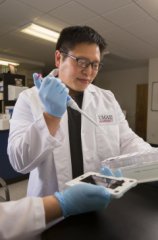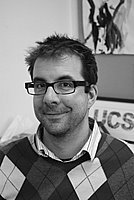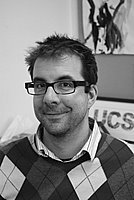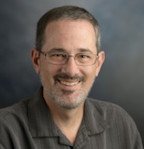News & Announcements
Chien Awarded $1.8 Million for Bacteria Research
Chien Awarded $1.8 Million for Bacteria Research
Peter Chien, a biochemist at the University of Massachusetts Amherst, recently received a five-year, $1.8 million NIH Maximizing Investigators’ Research Award (MIRA) to fund research into how bacterial cells manage stress responses. Because antibiotics pose a major stress for these microbes, the work will in part address what he calls “the alarming rise in multi-drug resistant bacteria.”
Chien, who is director of the Models to Medicine Center in the Institute of Applied Life Sciences at UMass Amherst, says that most bacteria are now resistant to commonly used antibiotics, and “the protease-based pathways we study in our lab represent new avenues to target as we look for new ways to fight drug resistance.” As director, he adds, “My goal is to move basic research into applied directions, to facilitate things like this research making an impact on a real-life problem.” Read more
Faculty Receive Seed Funding as Part of MTTC Acorn Innovation Fund
Faculty Receive Seed Funding as Part of MTTC Acorn Innovation Fund
Three research projects at UMass Amherst are among 13 at colleges and universities across the state sharing $195,000 in seed funding from the Massachusetts Technology Transfer Center (MTTC) Acorn Innovation Fund.
The $15,000 grants were awarded to researchers from the UMass system, Boston University Medical Center, Northeastern University, Tufts University and Western New England University to assist them in testing the viability of their technologies and potentially bringing their research to market.
At UMass Amherst, Byung H. Kim, and Yubing Sun, mechanical and industrial engineering, received a grant for a project titled, “A SERS-based immunoassay for cancer biomarkers detection.”Kim and Sun have developed a novel SERS-based antigen detection system that can quantify the concentration of biomarker with ultra-high sensitivity, reproducibility, and low cost. With Acorn funding, they hope to improve the technology so that it can be used to detect cancers in their early stage to increase the survival rate of patients. The funding allows them to test their technique to detect four different type of cancers: lung, liver, ovarian and pancreatic. Read more
Sam Hazen's Contributions to Scientific Entrepreneurship Featured in UMass Magazine Story: After Eureka
Sam Hazen's Contributions to Scientific Entrepreneurship Featured in UMass Magazine Story: After Eureka
Scary though it may seem, Baima and other UMass scientists can be bold in their entrepreneurial efforts—the UMass Institute for Applied Life Sciences (IALS) has their backs. IALS was launched in 2015 to help turn scientific discoveries into marketable products that improve human health and well-being.
IALS works in step with the Berthiaume Center for Entrepreneurship at the Isenberg School of Management, with the office of the Vice Chancellor for Research and Engagement through its Office of Technology Transfer and the UMass Innovation Institute, and other entities to fortify the campus start-up culture. The interdisciplinary institute includes 250 faculty from 28 academic departments and manages unique resources. These include state-of-the-art equipment organized into core facilities accessible to academic labs and industry alike, interdisciplinary lab space organized into research themes that allow faculty from different departments and even from different colleges to work close together, and lab space for start-up companies. Faculty, students, industry leaders, and entrepreneurs mingle in the institute’s conference spaces. To operate IALS, the university contributed more than $60 million in capital funds and operational support. The Commonwealth of Massachusetts itself is behind IALS, having invested $95 million through the Massachusetts Life Sciences Center. Read more
Professor Sam Hazen's Contributions to Scientific Entrepreneurship Featured in UMass Magazine Story: After Eureka
Professor Sam Hazen's Contributions to Scientific Entrepreneurship Featured in UMass Magazine Story: After Eureka
Scary though it may seem, Baima and other UMass scientists can be bold in their entrepreneurial efforts—the UMass Institute for Applied Life Sciences (IALS) has their backs. IALS was launched in 2015 to help turn scientific discoveries into marketable products that improve human health and well-being. Read more
Katz, Lyzinski to Explore Neuron-Level Mechanisms of How Brains Make Decisions
Katz, Lyzinski to Explore Neuron-Level Mechanisms of How Brains Make Decisions
Paul Katz, professor of biology and director of neuroscience, and Vincent Lyzinski, a network expert and assistant professor of mathematics and statistics, recently received a three-year, $3.5 million grant from the NIH’s National Institute of Neurological Disorders and Stroke for a new collaboration between researchers at four universities who will explore the neuron-level mechanisms of how the brain makes decisions.
The project is part of President Obama’s 2013 Brain Research through Advancing Innovative Neurotechnologies (BRAIN) initiative at NIH, which seeks to accelerate the development and application of new technologies leading to “a revolutionary new dynamic picture of the brain that, for the first time, shows how individual cells and complex neural circuits interact in both time and space.” Read more
UMass Amherst researchers studied origins of adverse effects of a common anti-cancer treatment
UMass Amherst researchers studied origins of adverse effects of a common anti-cancer treatment
Results of a new study by neuroscientists at the University of Massachusetts Amherst suggest that a new treatment approach is needed – and how this may be possible – to address adverse effects of aromatase inhibitors, drugs commonly prescribed to both men and women to prevent recurrence of estrogen-positive breast cancer.
Neuroscientists Agnès Lacreuse, Luke Remage-Healey and their graduate students at UMass Amherst, collaborator Jessica Mong at the University of Maryland and first author Nicole Gervais worked together on this research. Gervais, who conducted the experiments as a postdoctoral researcher at UMass Amherst, is now at the University of Toronto. The authors studied a small group of aged male and female marmosets, non-human primates whose brains are much like humans’ and which exhibit “complex behavior,” senior author Lacreuse explains. (Read more)
Researchers Study Dormant Cancer Cells and What Causes Them to Reawaken
Researchers Study Dormant Cancer Cells and What Causes Them to Reawaken
Researchers led by chemical engineer Jungwoo Lee are developing microenvironments that allow them to study how cancer cells that move around the human body change from dormant to active. Understanding this process, the researchers say, could lead to treatments to prevent cancer from metastasizing. Read more
NSF Supports UMass Amherst Scientists Creating New Discipline
NSF Supports UMass Amherst Scientists Creating New Discipline
A team of three researchers at the University of Massachusetts Amherst recently was awarded a three-year grant from a new National Science Foundation program to pursue an unusual intersection of their disciplines, which aims to grow an entirely new field, “touch-based bacterial communication,” on their campus and beyond. Polymer scientist Maria Santore, physicist Mark Tuominen and microbiologist Sloan Siegrist will receive $975,000 from NSF’s new “Convergence Program,” which aims to create new fields of study to address scientific issues by bringing together investigators from disciplines that are somewhat removed from each other, Santore explains. Read more
TARGET: BREAST CANCER
UMass scientists discover what causes this insidious disease and how to prevent it.
TARGET: BREAST CANCER
UMass scientists discover what causes this insidious disease and how to prevent it.
Breast cancer begins with one lethal rogue cell. Cancerous cells in the breast then grow out of control in a mind-boggling process that researchers worldwide have yet to fully understand, despite years of study and billions of dollars in funding. At the University of Massachusetts Amherst, researchers in many areas, backed by government organizations and private foundations, are attacking breast cancer on multiple fronts. They are investigating environmental toxins and breast milk, leading large epidemiological studies, creating new treatments, identifying individuals likely to get breast cancer, and advocating for changes in chemical testing and regulation. Read more
Twelve UMass Amherst Researchers Among Most Highly Cited in the World
Twelve UMass Amherst Researchers Among Most Highly Cited in the World
Twelve researchers at UMass Amherst, including MCB faculty Vince Rotello and Hang Xiao, have been recognized for being among the world’s most highly cited researchers in 2018. The analysis by Clarivate Analytics, owner of Web of Science, serves as the basis for regular listings of researchers whose citation records put them in the top 1 percent by citations for their field and year. Read more





